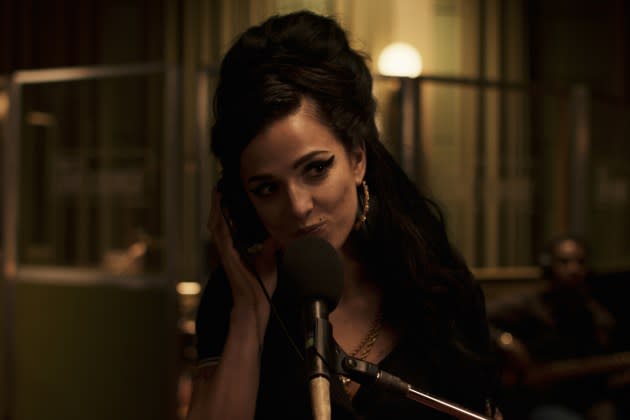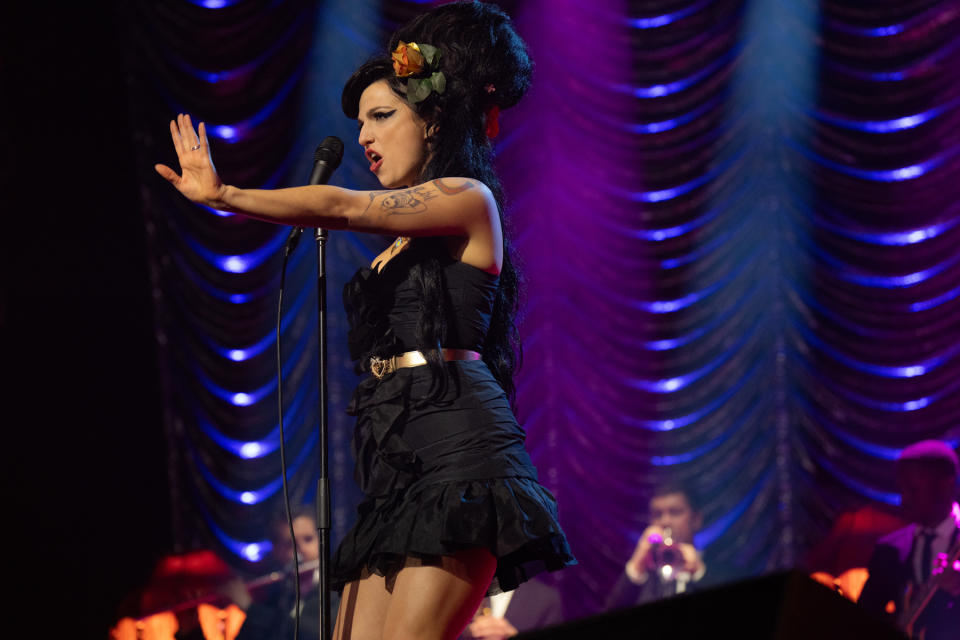‘Back to Black’: Amy Winehouse’s Biopic Is Seriously Out of Tune
- Oops!Something went wrong.Please try again later.

Amy Jade Winehouse could have been any young woman growing up in 1990s London — palling around with her mates, sneaking lagers, shagging dudes, getting into trouble, getting her nose pierced, and getting expelled from drama school for it. (That, and a few other reasons.) Until she opened her mouth, at which point she seemingly became possessed by a 1940s jazz chanteuse channeling centuries-old lust and sorrow. Winehouse went from a kid with a bluesy, contralto wail that almost felt like a parlor trick, considering that it was coming from a tiny white teen from Southgate, to being a recording artist signed to Island Records, former home of Bob Marley and U2. Then she added Grammy-winning superstar, paparazzi catnip, cautionary tale, and 27-club casualty to her résumé. All she ever hoped for, Winehouse said, was to be remembered for her own spin on a classic sound: “I just want people to hear my voice, and forget their troubles for five minutes.”
That request is heard over the opening scene of Back to Black, the biopic that attempts to Bohemian Rhapsody her back into a public conversation she never really left; it’s part of a voiceover reading of the essay that got her into the school she got thrown out of. Winehouse is running, and we eventually find out that the woman in the beehive hairdo looks blissful not because of where she’s going to but who awaits her at the end of the sprint. The movie doesn’t want to be a four-alarm funeral pyre but a tragic romance, presenting Amy through the prism of the amour fou that put her into a tailspin and fueled her triple-platinum second album. This way, it suggests, you’ll better understand the person behind that voice, which will undoubtedly make you forget your troubles because you’ll be overcome with so many memories of her troubles. Watch this dramatization and you’ll see someone head-over-fuck-me-pumps in love, heartbroken, self-destructive, publicly deteriorating, proudly drunk on vodka and her man’s scent, screaming at the world and eventually shuffling off it. Occasionally, the filmmakers are generous enough to remind you that she also made music.
More from Rolling Stone
Nick Cave and Warren Ellis Share a 'Song for Amy' Winehouse From 'Back to Black' Biopic
Amy Winehouse's 'Tears Dry on Their Own' Video Rereleased With Unseen Footage
It comes not to blindly praise she who refused to go to rehab, no, no, no (and eventually did), but dear lord, does it ever come to bury her. Directed by Sam Taylor-Johnson, Back to Black tries to be both a back-to-basics music biopic — complete with an early eureka moment (see: a young Amy gingerly working her way through the chords of “What Is It About Men” off her first album, Frank), success, setbacks, and a phoenix-like rise before the eventual fall — and a grittier, less-glamorous, more-complex look at an artist who lived her songs not wisely but too well. That it succeeds in neither aspect is not exactly surprising, given how at odds the movie seems to be with its subject and itself. Yet you do admire the fact that the film occasionally hints at something bolder, more unique hidden in its margins. Taylor-Johnson came out of the art world before she became a director, and there is an uncomfortable rawness in moments that adds textures and toughness to Winehouse’s headfirst plunge into an intoxicating union with a charming fuckup.
Indeed, we get to know Winehouse — played by Industry actor Marisa Abela, in what feels like a zero-sum game even by music biopic standards — as a bright young thing first, basking in the attention of her Sinatra-loving dad, Mitch (Eddie Marsan), and her doting grandmother Cynthia (Lesley Manville). She plays pubs and jazz clubs, pisses off a boyfriend with sideways swipes in her lyrics, fan-girls over Sarah Vaughn and Lauryn Hill. Winehouse is also the opposite of a hothouse flower, standing up to her management company and record execs and TV show hosts like Jonathan Ross and anyone who tries to reduce her to some easily categorizable, disposable commercial flavor of the moment. “I ain’t no fuckin’ Spice Girl!” she tells her reps, before signing with the same company that handles Ginger, Posh & Co. If you wanna be her lover, you do not have to get with her friends. Some tattoos, a porkpie hat, and an appreciation of her music would be nice, however.
From the moment she spots her pre-incarcerated Blake (Jack O’Connell), leaning on the bar and emanating pure, 100-percent rogue charm, you can tell that Winehouse is a goner. He seduces her with strong booze, strong arms, and her own songs on the jukebox; the finishing move is introducing Amy to the Shangra-Las’ “Leader of the Pack” and the entire notion of Sixties girl groups. The film wants a supporting cast of heroes and villains: Though Asif Kapadia’s 2015 documentary Amy, which we suggest viewing as both a complement and a counterpoint to this re-creation of greatest hits-and-misses, treats Mitch Winehouse as an enabler as much as a nurturer, Back in Black more or less treats him as the only thing standing between her and oblivion. No such clemency is given to Blake Fielder-Civil, unless you count the fact that it portrays Winehouse dipping into hard drugs solo to feel what he feels, rather than suggesting he introduced her to such vices firsthand. Not that it matters to those telling this story, per se. In their eyes, the real narcotic is Blake himself.
No one would be blamed for thinking Back in Black is under the exact same influence, what with it knowing he’s bad for Winehouse and where this addiction to his presence will lead her. But they can’t quit him any more than she can. The biopic pays lip service to her personal demons and desire to be a mother, her spiky demeanor when it came to sticking up for her songs, and her need to emotionally inhabit them regardless of the state of her heart. Taylor-Johnson has confessed that she wanted to make their Camden-based Bonnie-and-Clyde bond the lens through which we see Winehouse’s ups and downs, however, which tracks when it comes to O’Connell’s performance as the world’s most irresistible douchebag. Thanks to the actor, you can practically smell the stale cigarettes, yesterday’s fish and chips, and Axe Body spray on him. Abela, too, gives you the sense that there’s something about him that’s clouded her judgement and ramped up her hormones. Her singing is better than you’ve heard, even if you and she know that trying to conjure a singular voice is never going to replicate the real thing. Amy’s drunk-in-love feeling around her guy? That gets nailed to an uncanny degree.

Her need for him famously delayed work on her second album, which would have to be a juggernaut if it was going to break her in America. So, reluctantly, Winehouse goes to New York and begins work on what will be called Back to Black. And here is where the idea of foregrounding the Amy-Hearts-Blake Blues Explosion as the central tenet of her story starts to lose the plot. Good luck to anyone expecting to see, say, Jason Schwartzman or Adam Brody doing their best Mark Ronson impersonation — he gets name-dropped once but otherwise, the producer is MIA. (Taylor-Johnson has said that he was not included because he’s not really part of the couple’s “toxic love story,” which tells you all you need to know.) The recording of the title track is reduced to a montage interspersed with sequences from her grandmother’s burial. You want to know more about how Winehouse pulled off that incredibly moving session of a song that, even more than “Rehab,” defined her gorgeous, fatalistic, fuck-it sound. Instead, you get four snippets and a funeral. Something’s a little off here.
Ever since Bohemian Rhapsody kicked off a new gold rush of gold-record artists’ success stories, taking generic concert sequences and recording-booth epiphanies to task for being cliché has become the de facto criticism for the genre. When it comes to Back to Black, you’d kill to have more sequences of our faux-Winehouse onstage, tearing into more tunes, to balance out the indistinguishable paparazzi attacks and stock miserablism. You know the people involved in making this have great admiration, and possibly even love for her too-brief body of work, yet the movie seems almost embarrassed about having to cede the spotlight to it. There’s no sense of a gradual descent as seen through her suffering through songs — there’s just the suffering, period.
Sincere apologies if this is a spoiler, but they save “Rehab” for next to last, using her Grammys performance, her shock at winning, and her heartfelt speech as a last-gasp grab at uplift before the end. Then she buys a new house that is lit to look conspicuously like heaven, Amy ascends a staircase, and it’s all over but the trite, morbid disclaimer at the end. Back to Black fades away on its tragic story of burning out in a way that feels like it’s simply given up. To paraphrase another song title, it almost seems to know it’s no good, and quietly slinks away. The movie may be so scared of being an Auto-Tuned biopic that it settles for simply being out of tune altogether.
Best of Rolling Stone

